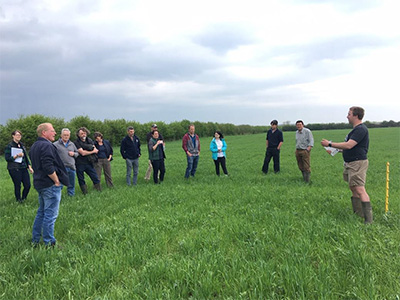Intercropping and Companion Cropping in Arable Systems
Posted on 4th May 2020
by organicresearchcentre
Innovative Farmers Field lab report from 2019 trials
Interest in Intercropping has been growing amongst farmers for some time. Intercropping has been shown to be beneficial for pest, disease and weed management, preventing lodging, improving water quality, soil fertility and biodiversity as well as increasing resilience to climatic and agronomic shocks. This Intercropping in arable systems field lab is looking at how farmers can use intercropping to make their arable systems more sustainable and productive
The Innovative Farmers field lab aims to explore opportunities for intercropping and companion cropping in arable systems including:
- Identifying beneficial combinations and their impact on key indicators selected for testing by farmers, e.g. weed burden, plant health, pest and disease damage and yield, in different contexts.
- Enabling farmers to share knowledge and experiences of working with different plant teams. Including peer to peer exchange on practical considerations, e.g. crop competition, establishment, machinery, harvest, separation and finding markets.
In 2018/19 three trials were drilled on two farms (T1 and T2 on Bockhanger Farm, Kent and T3 on Roundhill Farm, Wiltshire). Each trial had a different objective as outlined below:
- T1: Test the effectiveness of oats in reducing linseed loss during establishment via reduction of pest pressure
- T2 (A): Test the effectiveness of oats in reducing spring oil seed rape (OSR) losses (in a crop which is also intercropped with peas) via reduction in pest and disease pressure
- T2 (B): Test the effectiveness of OSR in supporting the pea crop and reducing lodging
- T3: Test whether intercropping beans with wheat reduces the weed burden in the bean crop and increases the protein content in wheat
Furthermore, for trials 1 and 2, different seed rates of the intercrop (oats for T1 and OSR for T2) were tested to determine what differences there are in the effect, and in yield, in relation to this factor.
Results and discussion
- T1: Linseed and Oats. Significant differences in linseed yield were found with both treatments containing oats yielding more than the monocrop. This suggests that there could be some mechanism through which oats aid establishment and yield of the linseed. Further investigation into the mechanism (allelopathy/distraction/repulsion) would allow for more general guidelines to be developed.
- T2: Peas, Oil Seed Rape and Oats. There was insufficient evidence to test the hypothesis that oats can reduce spring OSR losses (in a crop which is also intercropped with peas) via reduction in pest and disease pressure. Although the OSR did not make it through to harvest there were still some insights harvested from this trial. Firstly, the tissue tests suggested that the intercropped OSR’s nutrient levels were sufficient despite no artificial N being applied. This could suggest a facilitative effect between the pea and the OSR, which could be investigated further in future studies. At the same time there was no difference between the pea in intercrop versus monocrop suggesting that intercropping did not have a competitive effect on pea nutrition. This was also reflected in the pea yields – there was no significant difference between treatments which suggest there was no competitive effects of companion cropping with oats/OSR.
- T3:Wheat and beans. The results of this trial were consistent with the previous year with a much lower weed biomass in the intercrop versus the monocrop – 73% and 74% respectively. Furthermore, the intercrop had a higher total yield compared to the previous year, which the farmer feels is in part due to the lower wheat seed rate and higher bean seed rate. It seems that in very high wild oat infestations intercropping beans with wheat could enable the wheat to fill the niche of the wild oats, competing for nutrients and light and thus reducing weed abundance.
Read the full report Field lab: Intercropping and Companion Cropping in Arable Systems
2019 report

